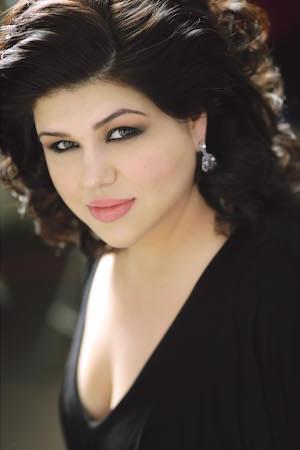For the last few years now, when people talk about American soprano Leah Crocetto, who’s currently making her Washington National Opera debut in the role of Madame Ledoine in a emotionally wrenching production of “Dialogues of the Carmelites,” they tend to swoon a little. They talk about her big, expansive soprano voice, the prizes she’s won, and the rise to stardom she’s had, especially at the San Francisco Opera, where she’s built a passionate following of fans.
It’s not difficult to join a dialogue of Crocettoites. You might also add to that a conversation with her reveals her natural warmth, a certain effusiveness and love of the life she’s leading, and a lot of emotion about the experience of preparing for “Carmelites,” a contemporary (it was written in the 1950s) opera about the dramatic, chilling fate of an order of Parisian nuns during the French Revolution.
“From the very first days of rehearsals,” Crocetto said in a phone interview, “it was always about being a part of a group. It’s not just about collaboration—this opera moved all of us, and that feeling of closeness grew. It’s a very emotional piece, you can’t help get caught up in it. I can’t remember a rehearsal where we weren’t crying.”
She’s repeatedly described as a rising star but by her track record and performance, she’s definitely gone beyond that. She has risen. She was a winner at the 2010 Metropolitan Opera Council Auditions Concert at the Met, represented the U.S. at the 2011 Cardiff BBC Singer of the World Competitions, and she’s frequently appeared at San Francisco Opera, where she has shown her star quality in numerous productions. Her roles are diverse, but also amount to highlight of great roles for sopranos—Desdemona in “Otello,” with the English National Opera, Mimi in “La Boheme” with the SFO, Liu in “Turandot” (at SFO and at the Met), Verdi’s Requiem, “Travatore,” and the Female Chorus in “The Rape of Lucrezia,” among many, many roles.
Here’s something you note, though as you watch and listen to Crocetto weave her way through the role of Madame Ledoine, which was once sung by Leontyne Price. The opera begins like a gust of wind and includes an almost terrifying death scene by the prioress. The revolution rages outside the walls of the convent as Ledoine arrives to take over.
You notice in all her singing, and her strong acting, that Crocetto’s Ledoine is a kind of glue in the making. She is visibly and vocally strong; you listen to her because of the voice, but also the persona. The two merge seamlessly as she sets about pulling her flock together against the surrounding threats and chaos. For a diva type, it’s a subtle thing. You can see her charges pulling together under the ministrations of her rich voice, guiding and leading, as they slowly come together as a group and rise, moving toward martyrdom. You can feel the emptiness in the house when she marches to her fate, and also the deep, resonance of her presence, bearing and voice.
“I think it’s a character that’s often misunderstood,” she said. “She is uneasy about the martyrdom but when the decided to embrace it, she leads them and protects them.”
Crocetto is part of a large Italian family from Michigan, which accounts for a lot of things. She was drawn to singing and opera at an early age. She likes to sing cabaret style too and loves jazzy torch songs a la Ella and Sara Vaughn. She has a “mild-mannered” Maltese named Ernie—after Ernest Hemingway, one of her favorite writers.
“Carmelites” will be performed at the Opera House March 5, 8 and 20. It opened February 21 in the middle of a major snow storm but many people braved the elements anyway. And Crocetto will always remember the occasion. “What we do as performers, directors and actors can be so profound.”
She wrote on her Facebook page the morning after the opening night. “ There is a reason we do what we do and more so now, than ever before. I believe opera is a calling. We are telling as story so much bigger than all of us”


